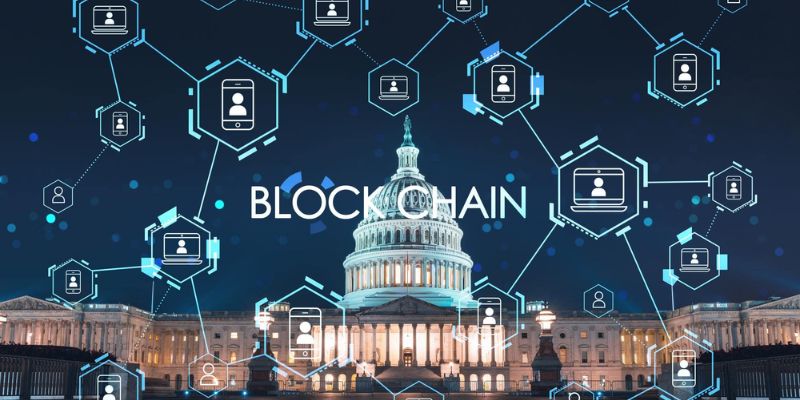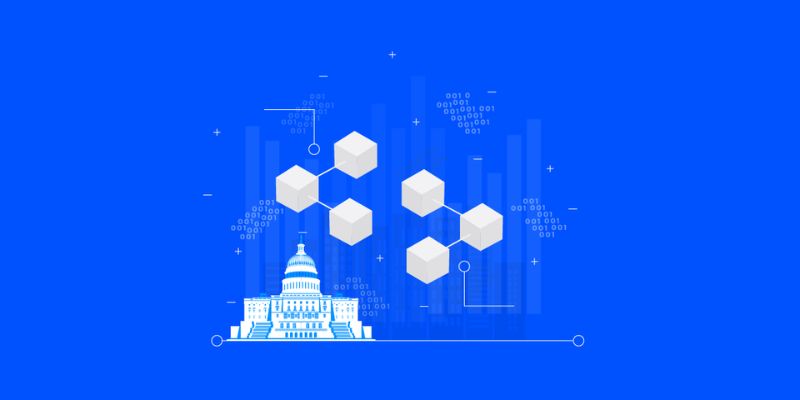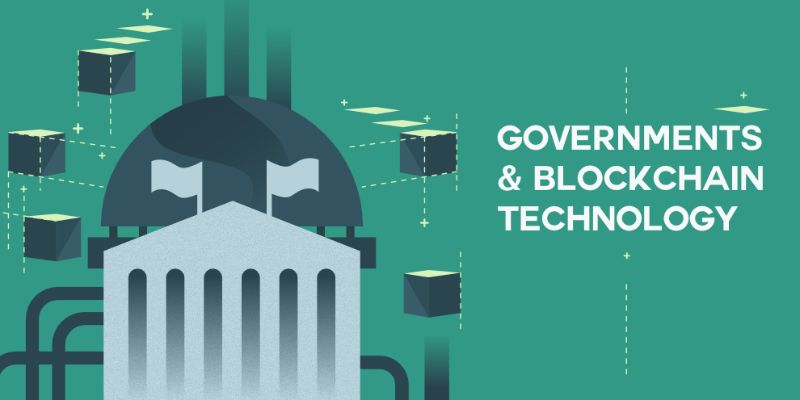Imagine a government with crystal-clear operations you can trust. Blockchain in government is not just a tech buzzword; it’s a game-changer. With it, the public sector becomes an open book, showing where every dime goes. It secures records like a vault, locking away private data from prying eyes. This tech is more than just safe; it’s a turbo boost for efficiency. The days of tangled red tape could be fading as blockchain breathes new life into public services. Now, contracts execute themselves with smart precision, and voting is no longer a question of ‘what if’ but ‘what now.’ Join me as we unpack how blockchain is sealing deals in trust and efficiency in government.
Enhancing Public Trust with Blockchain Transparency
Advancing Transparency in Government Spending
Why is blockchain good for government spending?
Blockchain makes sure all money moves are tracked and open. This builds trust.
You may ask how blockchain keeps government spending clear. It stores records that cannot change. This is saving and sharing data in a foolproof way. Everyone can see how funds are used. It discourages bad use of money. Hence, blockchain is like a watchman for your tax dollars. It’s why I push for blockchain technology in the public sector.
Let’s talk smart contracts for government. These are like set rules that run on their own. They pay contracts only when work is done right. No delays or lost funds. Everyone can check if a job is done and is paid for correctly. It’s a big win for trust and speed in government jobs.
Improving government accountability is one of blockchain’s best gifts. My role? I help set up these systems. They show citizens where every penny goes. This means less chance for sneaky business. Plus, it makes looking after money much easier for agencies.
Tax collection on blockchain is another area. Yes, even taxes get easier. It means making sure each person pays what’s due. No one can hide or twist numbers. This is fair and it helps with government trust.
Establishing Secure Public Records on Blockchain
What effect does blockchain have on public records?
It keeps records safe and sound. Changes can’t happen without a trace.
Putting public records on blockchain is a game-changer. Identity theft? Big drop. Land disputes from lost papers? Not anymore. Each person has clean, clear titles. Folks know for sure what land is theirs. It’s a safe bet for them and cuts down fights over land.
Voting systems using blockchain are getting lots of talk. People want elections they can believe in. Blockchain does that. Your vote gets locked in like a vault. Not a doubt about who you picked. Fair elections, happy people.
Cross-agency data sharing with blockchain makes work smooth between them. No more red tape. A secure path for info means things get done fast. This way, agencies help each other better.
Seeing governments turn to blockchain fills me with hope. Digital governance and blockchain join hands for honest, quick service. Every day, blockchain helps governments serve you better. It’s all about trust, and I love being a part of this change.
Strengthening Government Efficiency Through DLT
Streamlining Tax Collection and Government Procurement
Blockchain brings a big boost to tax work. It replaces old ways with smart contracts. These are like smart helpers that follow rules to get jobs done. Picture your tax forms auto-filling and filing themselves—fast and no mistakes. That’s what blockchain can do.
It also helps with buying things in government. Big purchases must be fair, no cheating. Imagine a digital helper keeping an eye on deals, making sure all is well. That means trust in where tax cash goes, and less waiting for needed things. It saves money and time. Now, let’s talk land and less red tape.
Optimizing Land Registry and Reducing Bureaucratic Processes
Picture owning land. You want to know it’s truly yours, right? Blockchain cradles this info like a steel safe. It stores who owns what, with no mix-ups. When buying or selling land, it’s clear and quick. By-the-book and no corners cut. This clears out piles of paperwork too. Fewer forms, fewer lines, fewer headaches.
And there’s more. With blockchain, data hops easily between offices, safe and sound. This means workers can focus on helping you, not just shuffling papers. It’s like a super team-up for government departments.
So, less mess, clear steps, all thanks to blockchain tech. This is how we shape a smarter government that puts your time first. And it’s not just faster. It’s smarter, safer, and sets the standard. When governments get in step with blockchain, everyone wins.
Innovative Governance: Blockchain for Public Services
Deploying Smart Contracts to Improve Public Sector Operations
Smart contracts are just like deals you make with friends. But for the government, they’re written in code and live on a blockchain. Imagine you want to hire a company to fix roads. In the past, lots of papers and people were involved. It took time and sometimes, things went wrong.
With a blockchain, when the company fixes a road, the contract checks the work. If the work checks out, the company gets paid right away. No extra wait. No lost papers. It’s quick, fair, and clear for everyone. This way, blockchain tech makes sure the government and companies keep their promises.
It’s like a super helper that works all the time, without needing breaks or snacks. This means the government can do more for us, without wasting time or money. And because everything’s recorded on the blockchain, we can all see it’s done right. This helps build trust between us and the government.
Implementing Blockchain in Voting Systems for Enhanced Democracy
Voting is a big deal. It’s how we all have a say in what happens where we live. But sometimes, people worry if their vote really counts. Now, picture a voting system where every vote is put into a big, unbreakable safe. That’s what blockchain can do for votes.
This tech keeps votes safe from changing or vanishing. Each vote is like a locked puzzle piece. Only the right match can fit and count it. No one can mess with the pieces once they’re locked in. This means our votes are counted just as we cast them.
Using blockchain for votes can also make voting easier. You could vote from your computer at home. No need to wait in lines. More people might vote since it’s easier. This could make things more fair for everyone. More votes mean we hear what more people want.
With more trust and more voices heard, truly, blockchain can bring a fresh touch to our democracy. It helps the government and us see eye to eye. It’s like getting a clearer, better channel to talk with our leaders. And that can make where we live a better place for us all.
Blockchain as a Tool for Integrity and Security in Government
Combating Corruption and Enhancing National Security
Corruption is a big problem. It takes away trust. People want a clean system. Blockchain helps here a lot. It makes sure each action is clear and tracked. No one can break or bend the rules. It’s great for keeping secrets safe too. Important stuff like country safety gets stronger with blockchain.
How does blockchain help fight corruption? It keeps a close watch. Each deal made on blockchain leaves a mark. No one can erase it. So, if someone tries to steal or cheat, we can spot it fast. This scares off bad folks. They know they might get caught easier. For national security, we use blockchain to keep files safe. No bad guys can sneak in to grab them.
Blockchain records all in a long chain. Each piece is locked tight. Think of a lock you can’t pick! This is how we keep things like our health files and who we are safe. We can share our details, but only when needed and with the right people. This helps with voting too. We can trust our votes stay secret and count right.
Promoting Transparent and Ethical Use of Blockchain in Health and Identity Management
People need good health care. This means their health records must be safe. And easy to get to when needed. Blockchain does this well. Doctors can see your health history without worry. It’s safe and quick. Your name and who you are also need to be safe. Blockchain makes sure of that. No mix-ups with who you are and what you have done.
Open and clean use of blockchain is a must. It should help and keep us all safe. When we use blockchain in health, we talk about rules. Like who can see your file and who can’t. The same with your ID. You control it. No one else. This stops bad use and makes sure it’s all okay.
Making health care better with blockchain is cool. Imagine doctors sharing what’s up with you, without mistakes. To prove who you are is also faster. No need for many papers. A quick check with blockchain does it all. It’s like having a magic key. It opens only what you say it can. This makes life easier for us all. It helps cut down long waits and clears up mess-ups.
In working with health files or IDs, blockchain is a true friend. It helps keep our one-of-a-kind info locked up but easy to reach when we need it. Say you move to a new place. Your new doctor gets your file in no time. No papers lost in the move. It’s all about making sure you can get what you need, safe and sound.
We’re always working to make blockchain better. We make it fit just right for what we need. This means our health and who we are stay ours. No one can grab them away. As a pal in making sure only we say who can see, blockchain is top-notch.
We’ve explored how blockchain can make our government more open and work better. We saw how it can change how money is spent and keep public records safe. It can also make paying taxes smoother and fix the way we keep track of land.
But that’s not all. We looked at how smart contracts can speed up public services. Plus, we considered a future where voting is safer with blockchain.
Imagine a government with less corruption and better national security. That’s where blockchain can lead us. It ensures health and identity info stays honest.
To sum up, blockchain is not just tech talk. It’s a key to a future where the government is for the people and by the people, in every click and code. Let’s build this future together.
Q&A :
How is blockchain being used in government sectors?
Blockchain technology is increasingly being utilized within government sectors to enhance efficiency, security, and transparency. By using a decentralized ledger, governments can streamline processes such as identity verification, property records management, and voting systems. This technology reduces the chances of fraud, improves data integrity, and can potentially lower operational costs.
What are the benefits of blockchain for government services?
The introduction of blockchain into government services offers numerous benefits including improved security against cyber threats due to its tamper-evident design. It also enhances transparency and accountability in government operations, ensuring data accuracy and trust among citizens. Blockchain can simplify bureaucratic processes, reduce paperwork, and increase the speed of governmental transactions, ultimately leading to better public service delivery.
Can blockchain improve voting systems in government?
Blockchain has the potential to significantly improve voting systems in government by offering a secure and transparent platform that can ensure the integrity of electoral processes. With features such as anonymity, traceability, and immutability, blockchain can help prevent voter fraud, coercion, and manipulation, while also making the voting process more accessible to citizens through electronic means.
What are the challenges of implementing blockchain in government?
Implementing blockchain in government presents several challenges, such as the need for substantial changes to existing legacy systems and regulations. There’s also the task of ensuring interoperability with other government systems and creating a legal framework that supports the use of blockchain technology. Addressing concerns related to scalability, security vulnerabilities, and the cost of transitioning to new infrastructure are other key hurdles governments face.
Are there any successful case studies of blockchain use in government?
Yes, there are multiple successful case studies illustrating the use of blockchain in government. For example, Estonia has been a pioneer in integrating blockchain technology within its e-governance system, allowing citizens to securely access public services. Similarly, countries like Georgia have utilized blockchain to manage and verify property transactions with significant reductions in fraud. These case studies demonstrate how blockchain can effectively be adapted for governmental purposes, showcasing the feasibility and benefits of the technology.




RELATED POSTS
DoS Attacks on Blockchain: Protecting Your Crypto from Cyber Threats
Protect Your Blockchain Network: Learn...
Guide to participate in TENEO Airdrop for beginners
Ready to explore the world...
Block Chain News: Unpacking Today’s Groundbreaking Developments
Explore the Latest Cryptocurrency Market...
What is blockchain and how does it work: Secrets of Digital Ledgers
What is blockchain and how...
Can you short Bitcoin? – Exploring the Secret
Can you short Bitcoin? This...
Unveiling the Future: Impact of quantum computing on blockchain
The Impact of quantum computing...
How to Keep Your Crypto Wallet Safe: 7 Unbreakable Security Tips
How to keep your crypto...
Challenges Of Implementing Blockchain For Businesses: Is Your Business Ready?
Navigate Blockchain Integration Barriers |...
What is a double-spending attack? How Safe Are Your Digital Transactions?
What is a double-spending attack?...
Explanation Of Blockchain Technology In Simple Terms: Guide to the Tech Revolution
"Understanding blockchain basics: Simplifying the...
Blockchain Security Essentials: Navigating the Regulatory Terrain
Understanding the Regulatory Landscape for...
What is a honeypot in Crypto? Unveiling the Deceptive Traps!
What Is a Honeypot in...
Can Blockchain Revolutionize Voting? Unpacking Fraud Prevention Potential
Can blockchain prevent voter fraud?...
Decentralized exchanges and tokenization: Tokenization’s Future Now
Discover the Essence of Decentralized...
Cost of Crypto Hacks: Are Your Investments Really Safe?
Understanding the financial impact of...
Blockchain Security Audits: What’s Under the Microscope?
What do Blockchain Security Audits...